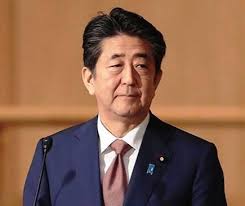
The longest serving Prime Minster of Japan, Shinzo Abe, announced his resignation because of poor health ending a tenure in which Abe sought to revive a deflation stricken economy and implementing a push for a stronger military.
According to experts, the sudden departure of Abe now triggers a battle for leadership in his Liberal Democratic Party (LDP) within the next few weeks. Analysts also said that it is likely that whoever leads the party and the government will follow Abe’s reflationary economics - the so called “Abenomics”, policies that had yielded mixed results in strengthening the third largest economy of the world.
It has been years that Abe has been suffering from ulcerative colitis and questions about whether he would be able to continue in office until the end of his current term in September next year were raised by his two recent hospital visits within a week.
There were tremors in Tokyo financial markets, Japan’s main stock market, on the news of Abe’s departure despite the already deepening concerns about his health. Under the watch of Abe, the value of the Tokyo stock market has more than doubled under Abe. But the news of Abe’s resignation saw a drop of 2 per cent at the exchange while there was an increase in the yen over concerns of a return to deflation.
“I cannot continue being prime minister if I do not have the confidence that I can carry out the job entrusted to me by the people,” Abe, 65, told a news conference as he announced his decision.
In the face of the country coping with the novel coronavirus, Abe did not ant to leave a vacuum in the government and the party, he said. It was a decade ago that Abe had resigned previously as Prime Minister because of poor health.
“I apologise from the bottom of my heart that despite all of the support from the Japanese people, I am leaving the post with one full year left in my term,” he said.
The challenges for Abe’s successor will include reviving an economy that is in its worst downturn since World War Two as well as to try and ensure holding of the Olympics nest year which was set to be held this year but was postponed because of the novel coronavirus pandemic.
According to media reports, interest in the top job has been shown by Japan’s former defence minister Shigeru Ishiba and former foreign minister Fumio Kishida. Media reports also propped up the name of Abe’s close aide, Chief Cabinet Secretary Yoshihide Suga, for the top job.
“The broad picture remains intact. In terms of economic and fiscal policy, the focus remains very much on reflation,” said Jesper Koll, senior adviser to asset manager WisdomTree Investments. “Longevity will be a struggle.”
Abe’s resignation happened just days after he went past a record for longest consecutive tenure as prime minster that was previously set by his great-uncle Eisaku Sato half a century ago.
(Source:www.reuters.com)
According to experts, the sudden departure of Abe now triggers a battle for leadership in his Liberal Democratic Party (LDP) within the next few weeks. Analysts also said that it is likely that whoever leads the party and the government will follow Abe’s reflationary economics - the so called “Abenomics”, policies that had yielded mixed results in strengthening the third largest economy of the world.
It has been years that Abe has been suffering from ulcerative colitis and questions about whether he would be able to continue in office until the end of his current term in September next year were raised by his two recent hospital visits within a week.
There were tremors in Tokyo financial markets, Japan’s main stock market, on the news of Abe’s departure despite the already deepening concerns about his health. Under the watch of Abe, the value of the Tokyo stock market has more than doubled under Abe. But the news of Abe’s resignation saw a drop of 2 per cent at the exchange while there was an increase in the yen over concerns of a return to deflation.
“I cannot continue being prime minister if I do not have the confidence that I can carry out the job entrusted to me by the people,” Abe, 65, told a news conference as he announced his decision.
In the face of the country coping with the novel coronavirus, Abe did not ant to leave a vacuum in the government and the party, he said. It was a decade ago that Abe had resigned previously as Prime Minister because of poor health.
“I apologise from the bottom of my heart that despite all of the support from the Japanese people, I am leaving the post with one full year left in my term,” he said.
The challenges for Abe’s successor will include reviving an economy that is in its worst downturn since World War Two as well as to try and ensure holding of the Olympics nest year which was set to be held this year but was postponed because of the novel coronavirus pandemic.
According to media reports, interest in the top job has been shown by Japan’s former defence minister Shigeru Ishiba and former foreign minister Fumio Kishida. Media reports also propped up the name of Abe’s close aide, Chief Cabinet Secretary Yoshihide Suga, for the top job.
“The broad picture remains intact. In terms of economic and fiscal policy, the focus remains very much on reflation,” said Jesper Koll, senior adviser to asset manager WisdomTree Investments. “Longevity will be a struggle.”
Abe’s resignation happened just days after he went past a record for longest consecutive tenure as prime minster that was previously set by his great-uncle Eisaku Sato half a century ago.
(Source:www.reuters.com)





